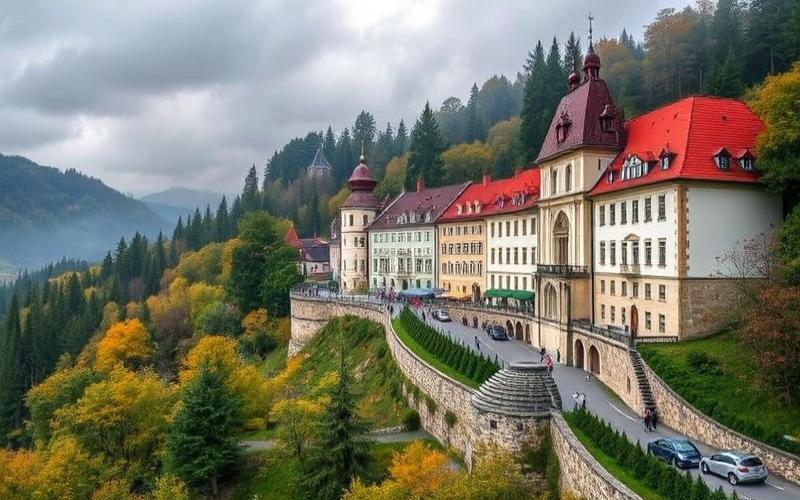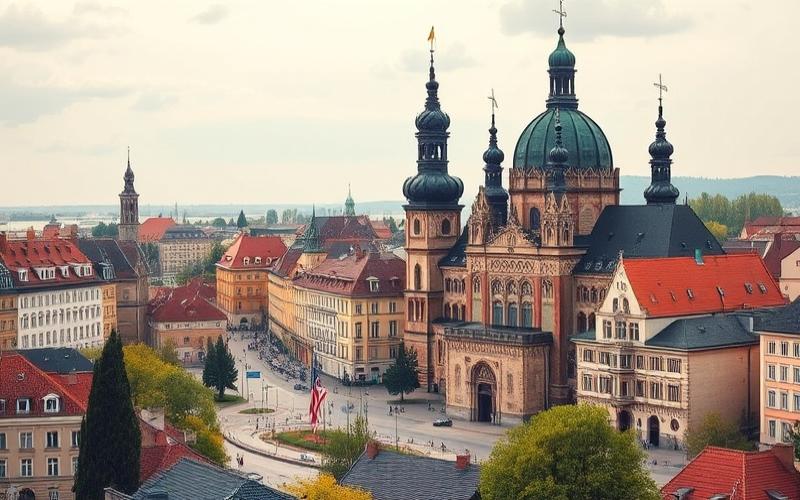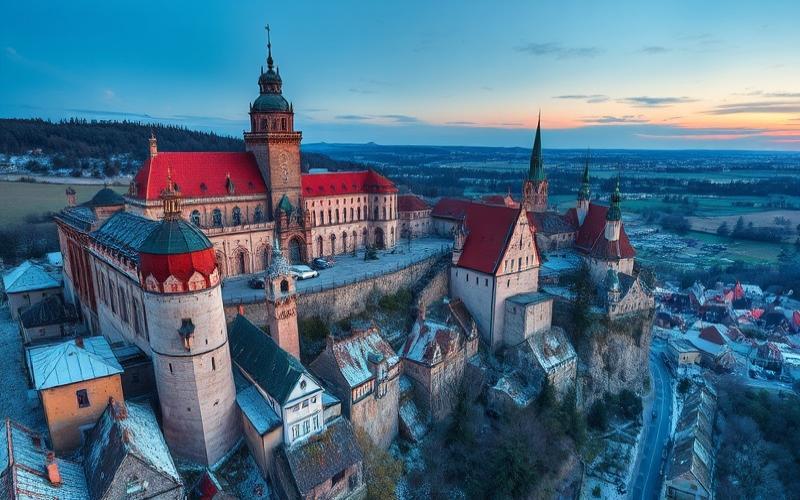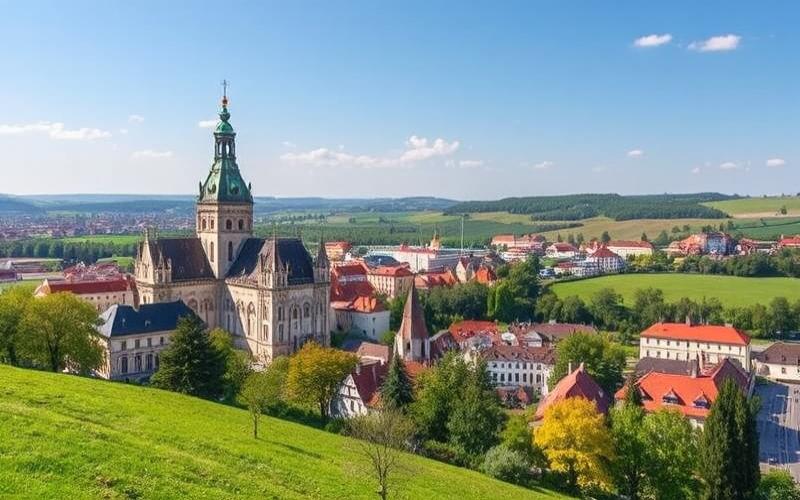
 Published on and written by Cyril Jarnias
Published on and written by Cyril Jarnias
The Polish real estate market has undergone significant evolution in recent years, opening up to innovative financing methods like crowdfunding. This participatory approach allows investors, whether novice or experienced, to contribute to real estate projects while benefiting from the leverage of collective financing.
In an increasingly dynamic economic context, real estate crowdfunding offers not only diversification opportunities but also access to projects previously reserved for major investors.
For those wishing to explore these options, understanding the modalities and specific advantages offered by this type of financing can prove crucial for maximizing investment opportunities in the Polish landscape.
Introduction to Real Estate Crowdfunding in Poland
Real estate crowdfunding is a participatory financing method that allows a large number of investors, primarily individuals, to collectively finance real estate projects led by developers or property dealers. This model relies on the intermediation of a specialized platform that connects project leaders with investors. Three main actors are involved: the developer (project leader), the platform, and the investors.
Operating Principles of Real Estate Crowdfunding:
- The developer creates a legal structure dedicated to each operation.
- Funds collected via the platform typically serve to complement the developer’s personal contribution and launch the project (preliminary studies, land acquisition).
- Financing occurs through bond lending (“crowdlending”) or equity participation (“crowdequity”).
- Upon project completion (resale or rental), investors recover their investment, increased by interest or capital gains.
- The average investment duration ranges between 2 and 3 years for crowdlending; it can extend up to 10 years for rental operations.
Main Advantages:
- Accessibility: ability to invest with a few hundred euros.
- Diversification: investment in various types of real estate projects.
- Attractive returns: annual rates often between 7% and 12% depending on the project nature.
Historical Overview and Development in Poland
In Poland, real estate crowdfunding gradually emerged in the second half of the 2010s, driven by the combined momentum of:
- A dynamic real estate market marked by constant growth,
- Growing interest in alternative investments,
- And the rapid development of financial technologies (“fintech”).
The first wave saw the emergence of several local platforms allowing Polish individuals—and later foreigners—easy access to this type of investment. Since then:
| Year | Key Event |
| Around 2015 | Launch of the first Polish platforms |
| From 2018 | Acceleration with the arrival of new fintechs |
| Since 2021 | Strengthened regulatory framework |
Regulation has been structured around:
- The gradual application of European rules on participatory financing,
- Increased controls focusing particularly on financial transparency and enhanced protection for small investors.
Common Types of Projects Funded in Poland
Operations funded via crowdfunding are varied:
| Type | Concrete Examples |
| New Residential | Construction of apartments/houses |
| Renovation | Rehabilitation/modernization of old buildings |
| Commercial | Development of offices/local stores |
| Mixed Projects | Buildings combining housing/offices/stores |
Other initiatives also include:
- Urban transformation (rehabilitated industrial lofts)
- Student residences
- Extension/expansion of commercial premises
General Perception & Growing Interest in Poland
Interest in this alternative mode continues to grow among Polish savers thanks to:
- An economic context characterized by a robust real estate market,
- Active search by Polish individuals/retirees—often facing low bank returns—for solutions offering high returns but controlled risk,
- The driving role played by certain metropolises like Warsaw, Krakow, or Wrocław where many of the proposed operations are concentrated.
Trends Observed Recently
- Continuous increase in the number of active individual investors on these platforms
- Increased diversification into different real estate segments
- Progressive strengthening of national/European legal framework
All this fits into a national economy where real estate remains perceived as a safe haven while now being accessible through means other than direct traditional purchase thanks to crowdfunding.
Good to Know:
Real estate crowdfunding in Poland allows investors to collectively finance real estate projects through online platforms, offering simplified access to real estate markets for those with limited funds. Since its emergence in the early 2010s, this model has gained popularity due to its transparency and ability to diversify investment portfolios. Funded projects mainly include residential and commercial development. Local regulations have been established to ensure investor protection and promote market transparency. In Poland, this financing method attracts more and more investors motivated by innovation and potential profitability, despite some caution regarding associated risks. This trend is supported by a stable economic context and a growing real estate market, making crowdfunding attractive in an ever-evolving financial landscape.
How Does Participatory Investment Work in the Polish Real Estate Sector?
Real estate crowdfunding platforms in Poland allow individuals to collectively invest in real estate projects, even with limited capital. Common models include crowdlending (loans), crowdequity (equity participation), and fractional investment.
Main Platforms Used in Poland:
| Platform | Main Model | Notable Features |
| TWINO | Real estate P2P lending | Auto-investment tools, protection |
| Mintos | Loan/crowdlending | International diversification |
| CrowdX | Fractional/Equity | European projects, including Poland |
| Lemox | Fractional real estate | Local Polish projects |
Other platforms such as Realty Bundles or FINEXITY are also present in this market.
Specific Platform Operation:
- Preselection and analysis of proposed real estate projects.
- Provision of a detailed project sheet: type (residential, commercial), location, financing plan, expected return.
- Investment possible from as little as a few tens or hundreds of euros.
- Online project tracking and regular reporting to investors.
- Distribution of rental income or capital gains after resale according to the chosen structure.
Trends & Major Players in the Polish Market:
The rapid growth of the sector is explained by a dynamic entrepreneurial culture and a relatively favorable regulatory environment. The market is diversifying towards:
- Urban residential projects,
- Green/sustainable real estate,
- Mixed office/commercial operations.
The main players remain large international platforms operating locally but also some Polish startups specialized in participatory real estate.
Typical Steps of the Investment Process:
- Select a licensed platform;
- Create an investor account;
- Browse available projects;
- Analyze key information: expected duration, minimum ticket, estimated return;
- Invest the desired amount via bank transfer or card;
- Periodically receive progress reports;
- Receive interest/income or repayment upon exit/project completion.
Simplified example:
1️⃣ Registration ➡️ 2️⃣ Project Selection ➡️ 3️⃣ Investment ➡️ 4️⃣ Monitoring ➡️ 5️⃣ Return on Investment
Current Legal & Regulatory Framework:
Polish regulation distinguishes several forms of crowdfunding:
- Crowdlending is subject to national financial supervision with platforms required to obtain a specific license.
- Crowdequity partially falls under European MiFID II legislation concerning public offerings of financial securities (shares).
- Since November 2021, the European ECSP Regulation (European Crowdfunding Service Providers) harmonizes certain aspects to strengthen protection for non-professional investors while facilitating cross-border access to participatory real estate offers.
Caps exist on certain invested amounts to limit individual risk; each platform must clearly communicate these risks as well as its internal procedures for selection/protection against defaults/potential fraud.
Recent Concrete Examples:
| Project | City | Type | Amount Raised |
| Kossaka Residence | Warsaw | New Residential | ~€600,000 |
| Green Office Polna | Poznań | Eco-friendly Offices | ~€850,000 |
Some projects have focused on energy renovation or aim to revitalize underdeveloped urban neighborhoods through collective participatory financing.
Advantages for Individual Investors:
- Facilitated access to the real estate market without needing high capital
- Possible geographical and sectoral diversification
- Fully digitized process
- Potential returns superior to some traditional investments
Synthetic list:
- Low minimum investment
- Increased transparency through regular reporting
- Natural risk pooling
Associated Risks & Management:
- Risk specific to the developer/project leader
- Partial illiquidity until final completion
- Potential fluctuation in local real estate values
→ Management via strict preliminary audits, equity required by some platforms before public collection, and contractual mechanisms limiting individual exposure to potential losses.
Key Takeaway:
Real estate crowdfunding offers Polish individuals innovative access to this attractive sector but requires vigilance regarding platform/project choice as well as good legal understanding before any significant operation.
Good to Know:
In Poland, participatory investment in real estate, or real estate crowdfunding, is conducted through popular platforms like CrowdEstate and BrickVest, which allow investors to select specific projects to fund in exchange for a share of future profits. These platforms stand out for their transparency and various roles, ranging from financial intermediary to partnership project management. Procedures include meticulous project selection, risk assessment, and contractual engagement defined by the Polish legal framework, notably regulated by the KNF, the Polish Financial Supervision Authority. The Polish real estate crowdfunding market is booming with trends showing strong demand for urban residential and mixed projects, such as the Krakow Green Apartments project which recently reached its funding in less than five days. This type of investment offers advantages like diversification and high return potential, but also risks related to real estate market volatility and potential project failures, often partially mitigated by mechanisms like guarantee funds offered by some platforms.
The Most Reliable Real Estate Crowdfunding Platforms in Poland
To assess the reliability of real estate crowdfunding platforms in Poland, investors must examine several essential criteria:
Reliability Criteria to Consider:
- Project Transparency: Access to detailed project sheets (objectives, risks, deadlines) and regular reporting.
- Platform Reputation and History: Number of years in operation, total volume financed, success rate of operations.
- User Reviews and Feedback: Experiences shared on specialized forums or review sites.
- Regulation by Polish (or European) Authorities: Holding of an official license such as PSFP or equivalent issued by the Polish Financial Supervision Authority (KNF).
- Default/Delay Rates on Repayments.
| Platform | Distinctive Characteristics | Types of Projects Funded | Rates/Returns* | Notable Examples |
|---|---|---|---|---|
| Homunity | European passport for Poland. High transparency. Educational blog. | New residential/renovation | ~9% net | Residential program in Warsaw |
| Wevest | PSFP license. Very detailed sheets. No lender fees | Rental & residential real estate | High rates | Rental project Poznań |
| CrowdEstate Poland† (local example) | Local interface, strict selection | Residential/commercial | 8–11% | Office building Krakow |
Concrete Success Examples
- A residential project in Warsaw via Homunity allowed early capital repayment with a return exceeding 9%, with no reported delays.
- On CrowdEstate Poland†, a commercial building in Krakow exceeded its initial objectives thanks to high occupancy rates post-delivery.
Practical Tips for Choosing Your Platform:
- Verify official presence or license with the KNF or via European passport if the platform is foreign but legally operating in Poland.
- Analyze the level of transparency: prefer those that regularly publish their statistics and annual reports.
- Carefully study independent reviews as well as the historical real rate of delays/defaults on each site.
- Diversify investments across multiple platforms/projects to limit exposure to specific risk.
Before any decision, it is essential to conduct thorough research on each proposed project: read all documents made available by the platform and verify their consistency with your personal objectives (desired duration, acceptable risk level).
Never invest without fully understanding where your money is going or without verifying that the platform holds all required licenses!
†CrowdEstate Poland is cited here as a typical example; always check the current state of the market as some platforms may evolve rapidly in this dynamic sector.
Only invest what you are prepared to lose – even on a reputable platform!
Good to Know:
In Poland, choosing a reliable real estate crowdfunding platform requires considering project transparency, site reputation, user reviews, and regulation by local authorities. Among the most recognized platforms, Mzuri CFI and Crowdestate stand out. Mzuri CFI is appreciated for its high success rate and focus on residential renovation projects, while Crowdestate is recognized for its diversity of projects ranging from commercial buildings to rental housing. Note that regulation by the Polish Financial Supervision Authority strengthens investor confidence. Investors should analyze historical returns, such as those from residential projects in Warsaw which generated returns exceeding 10% annually, and consult reviews to assess customer satisfaction. It is crucial to conduct thorough research by performing checks of legal documentation, comparing management fees, and evaluating transparency policies for each platform before committing, to ensure the investment experience aligns with their financial goals and risk tolerance.
Advantages and Challenges of Real Estate Crowdfunding in Poland
Advantages of Real Estate Crowdfunding in Poland
- Increased Accessibility for Small Investors
- Real estate crowdfunding allows individuals to access real estate projects formerly reserved for large institutional investors. Thanks to this model, it’s possible to participate with reduced starting capital, making property investment much more democratic.
- Facilitated Diversification
- Platforms offer simplified access to a wide variety of projects (residential, commercial, sustainable), allowing investors to diversify their portfolio and thus pool risks.
- Transparency and Professional Management
- Polish platforms emphasize transparency: detailed information on each project, regular monitoring, and accessible reporting for all participants. Management is ensured by sector professionals.
| Advantage | Explanation |
|---|---|
| Low Entry Ticket | Ability to invest from a few hundred or thousand zlotys |
| Project Diversity | Simple access to different types of real estate assets (new housing, renovations…) |
| Transparency | Clear information on the project, its leader, and viability |
| Local Economic Impact | Direct participation in urban or regional development |
Challenges of the Polish Model
- Inherent Risk in Real Estate Projects
- Financial viability is never guaranteed: construction delays, commercial difficulties, or technical defects can affect expected profitability.
- Evolving Regulatory Environment
- The legal framework surrounding real estate crowdfunding remains young in Poland; it evolves rapidly but may still lack harmonization or leave some gray areas regarding investor protection.
- Need for Investor Awareness
- It is crucial that each investor carefully analyzes the specific conditions of the project (proposed contract, possible guarantees) before any commitment.
- Financial risk specific to the local market
- Sometimes incomplete regulation
- Need for thorough due diligence by the investor
Concrete Examples in Poland
- Platforms like Crowd Real Estate have enabled participatory financing for:
- Residential buildings in the Warsaw region,
- Mixed operations combining stores and housing in several medium-sized cities,
- Support for sustainable development through energy renovations (“green projects”).
- Several campaigns that reached or even exceeded their objectives show that this operational mode appeals to both developers and savers.
Economic Opportunities for the Polish Market
- Active contribution to urban renewal;
- Direct support for local SMEs;
- Potential job creation throughout the construction period;
Key Takeaway: Real estate crowdfunding constitutes an innovative opportunity to energize the Polish market while offering a new secure channel—provided that the investor remains vigilant regarding inherent risks.
Good to Know:
Real estate crowdfunding in Poland presents significant advantages such as democratizing access to real estate investments, allowing even small investors to diversify their portfolio with modest capital. Platforms also bring increased transparency, which reassures investors about the nature of projects. However, challenges remain, including risks related to the viability of funded projects and regulation still under development that requires particular attention from stakeholders. It is crucial for investors to well understand the ins and outs of each project; concrete examples, such as successful investments in residential complexes in Krakow and Warsaw, illustrate the opportunities offered by this model. These investments support local economic growth and show the potential of real estate crowdfunding, despite the need to stay informed of legislative developments and specific conditions.
Disclaimer: The information provided on this website is for informational purposes only and does not constitute financial, legal, or professional advice. We encourage you to consult qualified experts before making any investment, real estate, or expatriation decisions. Although we strive to maintain up-to-date and accurate information, we do not guarantee the completeness, accuracy, or timeliness of the proposed content. As investment and expatriation involve risks, we disclaim any liability for potential losses or damages arising from the use of this site. Your use of this site confirms your acceptance of these terms and your understanding of the associated risks.


















































